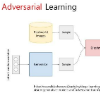Anomaly detection is a ubiquitous and challenging task relevant across many disciplines. With the vital role communication networks play in our daily lives, the security of these networks is imperative for smooth functioning of society. To this end, we propose a novel self-supervised deep learning framework CAAD for anomaly detection in wireless communication systems. Specifically, CAAD employs contrastive learning in an adversarial setup to learn effective representations of normal and anomalous behavior in wireless networks. We conduct rigorous performance comparisons of CAAD with several state-of-the-art anomaly detection techniques and verify that CAAD yields a mean performance improvement of 92.84%. Additionally, we also augment CAAD enabling it to systematically incorporate expert feedback through a novel contrastive learning feedback loop to improve the learned representations and thereby reduce prediction uncertainty (CAAD-EF). We view CAAD-EF as a novel, holistic and widely applicable solution to anomaly detection.
翻译:异常检测是一项贯穿许多学科且具有挑战性的任务。由于通信网络在日常生活中发挥着关键作用,这些网络的安全对于社会顺利运作至关重要。为此,我们提出一个新的自我监督的深层次学习框架CAAD,用于在无线通信系统中发现异常现象。具体地说,CAAD在对抗性结构中采用对比式学习,以了解无线网络中正常和异常行为的有效表现。我们用一些最先进的异常现象检测技术对CAAD进行严格的绩效比较,并核实CAAAD取得了92.84%的平均绩效改进。此外,我们还增强CAAAD,使其能够通过新的对比式学习反馈循环系统系统地纳入专家反馈,以改进所学的表述,从而减少预测的不确定性(CAAAD-EF)。我们认为CAD-EF是发现异常现象的一种新颖、全面和广泛应用的解决办法。



